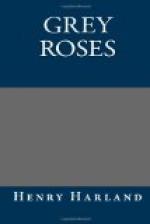Wilford left for England without dining again at the Hotel d’Angleterre. We were busy ‘doing’ the country, and never chanced to be at Biarritz at the dinner hour. During that week I scarcely saw Sir Richard Maistre.
Another little circumstance that rankles especially now would have been ridiculous except for the way things have ended. It isn’t easy to tell—it was so petty and I am so ashamed. Colonel Escott had been abusing London, describing it as the least beautiful of the capitals of Europe, comparing it unfavourably to Paris, Vienna, and St. Petersburg. I took up the cudgels in its defence, mentioned its atmosphere, its tone; Paris Vienna, St. Petersburg were lyric, London was epic; and so forth and so forth. Then, shifting from the aesthetic to the utilitarian, I argued that of all great towns it was the healthiest, its death-rate was lowest. Sir Richard Maistre had followed my dissertation attentively, and with a countenance that signified approval; and when, with my reference to the death-rate, I paused, he suddenly burned his ships. He looked me full in the eye, and said, ‘Thirty-seven, I believe?’ His heightened colour, a nervous movement of the lip, betrayed the effort it had cost him; but at last he had done it—screwed his courage to the sticking-place, and spoken. And I—I can never forget it—I grow hot when I think of it—but I was possessed by a devil. His eyes hung on my face, awaiting my response, pleading for a cue. ‘Go, on,’ they urged. ’I have taken the first, the difficult step—make the next smoother for me.’ And I—I answered lackadaisically with just a casual glance at him, ’I don’t know the figures,’ and absorbed myself in my viands.




